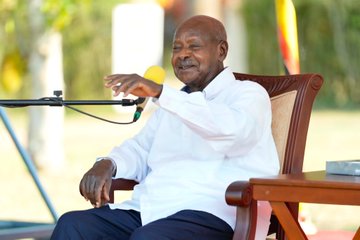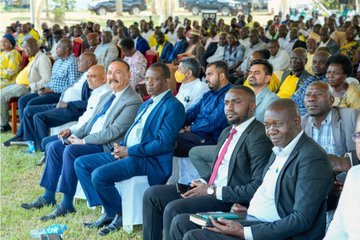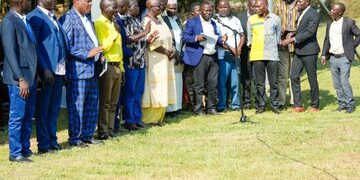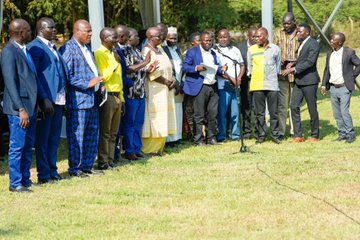President Yoweri Kaguta Museveni has revealed that the government will purchase Mayuge Sugar Factory to benefit sugarcane farmers in the Busoga region.
The announcement was made on Wednesday, August 6, 2025, during a meeting with sugarcane farmers, millers, and sugar manufacturers from across the country at Kityerera State Lodge in Mayuge. The initiative is part of the government’s commitment to establish a sugar processing plant for Busoga farmers.
During the meeting, sugarcane farmers endorsed the government’s plan to begin negotiations for the factory’s acquisition. The new ownership structure is expected to improve equity in the sugar industry and ensure farmers receive a fair share of profits.
“I pledged to build a sugar factory for you,” President Museveni said. “Recently, the owners of Mayuge Sugar Factory offered to sell it to me so it can serve the poor. Do you agree?” he asked, receiving a unanimous “Yes!” from the farmers.
“Okay, we shall negotiate with them and buy it for you,” he assured them.
The meeting brought together stakeholders from Uganda’s major sugarcane-growing regions—Busoga, Buganda, Western, and Northern Uganda—and forms part of the President’s broader agenda to reform agro-industrialisation and fight rural poverty.
Fate of CN Sugar and Shakti Sugar to Be Decided by Cabinet
In the same meeting, President Museveni said Cabinet will soon decide the fate of CN Sugar Ltd and Shakti Sugar Ltd, which were closed due to operational challenges. He noted that the matter will be discussed at the next Cabinet sitting on Monday.
President Museveni also directed Hon. Francis Mwebesa, Minister for Trade, Industry, and Cooperatives, to immediately implement the Sugar Council as provided for under the Sugarcane (Amendment) Act, 2023, which was passed by Parliament in April 2025. He instructed that the names of council members must be confirmed by next week.
The Council, once established, will regulate the sugar industry and represent both growers and millers. It will comprise a Chairperson, four representatives of sugarcane out-growers, four representatives of millers, and Permanent Secretaries from the Ministries of Agriculture, Finance, and Trade.

5% Sugarcane Levy Abolished
Mr. Budugo Isa, Chairperson of the Uganda National Association of Sugarcane Growers, raised concerns about the continued deduction of a 5% levy from farmers delivering cane to factories—a cost management charge that was supposed to be abolished under the new law.
“We had hope in this council, but the Ministry of Trade is taking too long to implement it,” Budugo said.
President Museveni responded firmly, ordering an immediate halt to the charge and urging millers to reject unclean sugarcane mixed with husks and tops.
“Can we now agree? Reject the unclean sugarcane,” the President said. “And the 5% charge must stop.”
Minister Mwebesa committed to introducing new regulations in line with the President’s directives and revealed that government had secured funds to compensate suppliers of the Atiak Sugar Factory, with payments set to begin next week.
Sugarcane Not Viable for Small Landholders
In a wide-ranging speech, President Museveni emphasized that sugarcane growing is only viable for farmers with large landholdings. He explained that the average return—UGX 4 million per acre per year—is insufficient for families with less than five acres of land.

“Sugarcane should be grown by people with large chunks of land,” he said. “Those with two acres will never escape poverty with sugarcane. Let’s be clear.”
He recommended the Four-Acre Model for smallholder farmers, which combines food crops, coffee, pasture, and an income-generating activity such as livestock, poultry, fish, or piggery.
Museveni cited Joseph Ijara of Serere District, who earns over UGX 1 billion annually from 2.5 acres through poultry and zero-grazing dairy farming. Another farmer, Nyakana, earns UGX 300,000 daily from eggs alone—equivalent to UGX 108 million annually.
He also discouraged smallholders from growing cotton, noting that only large-scale farming on institutions like prisons or commercial farms could make cotton profitable.
Additional Support for Farmers
To improve sugarcane productivity, President Museveni pledged a revolving fund to enable farmers to purchase fertilizers. Mr. Budugo welcomed the commitment and also thanked the President for pledging to provide tractors and halting the controversial practice of burning sugarcane tops, which he said are a valuable source of animal feed.
“One acre of cane tops can feed three cows,” Budugo explained.
Political Support from Busoga
The Third Deputy Prime Minister, Rt. Hon. Rukia Nakadama Isanga, welcomed the President to Mayuge and reaffirmed Busoga’s political support for his leadership.
“This time, the Basoga want to campaign for you themselves,” she said. “They don’t want outsiders coming in to speak for you without understanding our local issues.”
Hajji Idi Isabirye, MP for Bunya South and Chairperson of the Busoga Parliamentary Caucus, praised the President for tackling challenges in the sugar sector and investing in swamp reclamation. He also commended the transformation around Mayuge State Lodge, calling it a source of inspiration for the local community.
The event was attended by senior government officials, Members of Parliament, and other key stakeholders.











